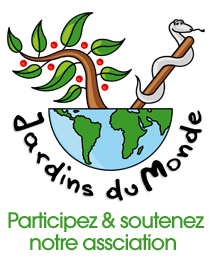Who are we?
‘Jardins du Monde’ is a French non-profit whose primary mission is to improve the health conditions of poor populations. It aims to help those who live in remote communities who do not have access to modern medical care.
In many countries, precarious sanitary conditions exist. However, the traditional use of plants is widespread and significant scientific research helps to deepen the existing knowledge of medicinal plants.
According to the World Health Organization, 80% of earth’s population uses traditional, ancestral knowledge about medicinal plants when it comes to treating certain illnesses. Plants are used sometimes by choice, but more often than not, out of necessity.
Unfortunately, we are losing this traditional knowledge concerning medicinal plants. Furthermore, the threat to biodiversity in general is affecting medicinal plants; they are not as prolific or available to the populations who need them most as they used to be.
Jardins du Monde studies locally used medicinal plants and shares scientific data with its partners, health institutions, NGOs and local rural associations.
Jardins du Monde’s activities, with the participation of rural populations, help improve the conditions of everyday life in terms of hygiene and health. This improves access to care for those most in need by developing the use of natural resources found locally along with the implementation of a health education program. The overall goal is to try to protect and preserve these natural resources and traditional know-how.
Since 1992, Jardins du Monde intervenes on behalf of local populations in partnership with rural communities, villages and urban organizations by applying a methodology adapted to the specific needs of the area. This includes:
– Ethnobotanic studies of traditional and local pharmacopeia and pathologies
– Collecting scientific information on identified plants.
– Looking for therapeutic solutions that can be adapted wide scale.
– Writing and publishing educational material.
– Setting up ‘teaching gardens’ and carrying out health trainings so that everyone has access to information about medicinal plants.
– Teach mothers and local health workers on how to use medicinal plants by following an adapted protocol.
– Create awareness for health issues and the need to protect the environment through theatre presentations.
– Making traditional-yet-improved remedies using medicinal plants and making them available to local populations by developing gardens and sales areas.
– Collaborating on medicinal plant research related to ‘neglected’ diseases such as malaria.
– Publishing scientific articles.
– Adapting to local health and biodiversity situations.
– Facilitating access to drinking water.
– Ensuring a nutrition program for children under age 5 and training of the mother about reasons of malnutrition
– Teaching mothers the basics of good nutrition.
– Planting local plant species.
– Setting up protected areas of land at the request of the local population.
– Developing medicinal plant production geared toward fair trade in order to provide a source of revenue for local populations.



